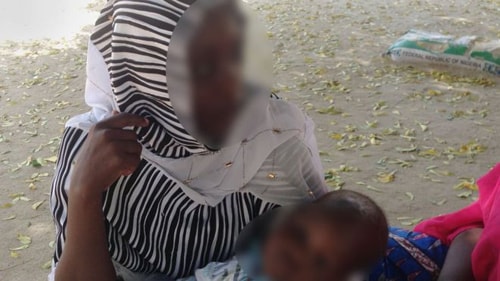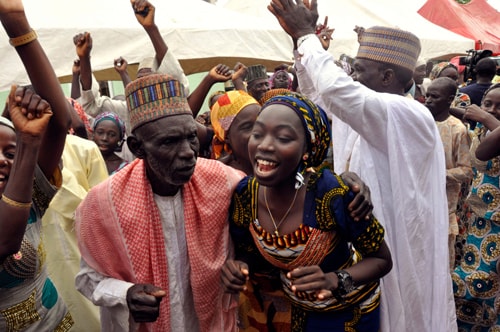Kidnapper love syndrome among women in Nigeria
After being rescued, many victims of Nigerian rebels Boko Haram have sought to return to live with their former captors.
Last May, the Nigerian Islamist militant group Boko Haramreleased 82 schoolgirls from a group of more than 200 they kidnapped from Chibok in 2014. Among the freed girls, some refused to return home, according to the BBC.
Many people find it hard to believe when watching videos of women abducted by Boko Haram militants saying they are happy with their new life in the Sambisa forest, the militant base in northeastern Nigeria.
"It must be Stockholm syndrome," some netizens commented. Stockholm syndrome is aThe psychological state of a long-term hostage or kidnapper changes from fear and hatred to affection, sympathy, and even protection of the kidnapper.
"Fairy tale"
 |
Aisha Yerima and her two-year-old son, the result of her marriage to a Boko Haram gunman. Photo: BBC. |
More than four years ago, Aisha Yerima, now 25, was kidnapped by Boko Haram militants. She later married a commander of the rebels. According to Yerima, this commander loved her very much, in addition to expensive gifts, he also romantically sang her lyrical Arabic love songs.
Yerima felt like she was living in a fairy tale. But it all ended when the Nigerian army attacked Boko Haram's base in the Sambisa forest in 2016.
After being freed, Yerima spent eight months in a psychological therapy program sponsored by the Nigerian government.
"Now I understand that everything the Boko Haram militants told me was a lie," she said after finishing her treatment.
However, less than 5 months after returning to his family in the northeastern cityMaiduguri,Yerima managed to return to Boko Haram's base in the forest.
"The kidnapped women, who are taken to different camps, are treated differently depending on the camp commander. The women who are treated better are more likely to marry a Boko Haram fighter or volunteer to join the group," said Dr. Akilu, who has five years of experience.treating many cases linked to the Islamist militant group, including the wives and children of gunmen, along with hundreds of women who had been kidnapped by the group.
Yerima said that while in the Sambisa forest, as the commander's wife, she had servants and was respected by everyone, and even followed her husband to the battlefield.
"These women (before being kidnapped by Boko Haram) were mostly unemployed, had no voice, had no influence in the community where they lived. And suddenly, they were given full authority to manage and order around 30 to 100 other women," Dr. Akilu explained why so many victims likeYerima would rather live among the Islamic rebels than return to live with her family like before.
"When they return to society, most of these women (do not feel happy) because they lack the feeling of holding that kind of power in their hands."
Psychological trauma
 |
Victims, kidnapped by Boko Haram Islamist militants, are reunited with family and loved ones in the Nigerian capital in May. Photo: AFP |
"Being brainwashed is only one side of the problem. Reintegration into society is another. Many victims have no means of livelihood when they return to their families," Dr. Akilu explained that women abducted by Boko Haram after being released have to endure stigma and discrimination from those around them.
“The psychological support programs (sponsored by the government) only last for a certain period of time. At the end of the program, they seem to be stable but in reality, after returning to their families, they struggle. That is what leads them back to (Boko Haram).”
FamilyYerima is still reeling from the news that her daughter left home, even though, according to Yerima’s mother, Ashe, at least seven other women, wives of Boko Haram gunmen, all friends of her daughter, have done the same thing.
“Every time one of them disappeared, their families would come to my daughter and ask if Yerima had heard anything about their child,” said Ashe, who said several women had contacted her daughter after returning to the rebels and that Bintu had heard at least two phone calls between Yerima and them.
"They tried to convince my sister to come with them but she refused," Bintu said. "She said she didn't want to go back there."
Unlike many other victims,Aisha Yerima seemed to regain her balance very quickly. She started going out to earn money by selling fabrics and actively participating in local activities, even regularly updating information on social networks and making friends with people.
"At least five people have offered to marry her," she said.Ashe said.
Everything was going smoothly until one day Yerima received a phone call from a woman informing her that her ex-husband was living with another woman in the woods.Sambisa. After the phone call, Yerima became quiet and reserved.
"She suddenly stopped going out, stopped talking and even skipped meals," Bintu's sister recalled. "She looked very sad."
Two weeks later, Yerima left home. She turned off her mobile phone and took with her two-year-old son, whom she had with the Boko Haram gunman, but left behind her older son from a previous marriage.
"Those women wanted to see their husbands, fathers and children reunited," Dr. Akilu explained Yerima's actions.
According to VNE
| RELATED NEWS |
|---|
